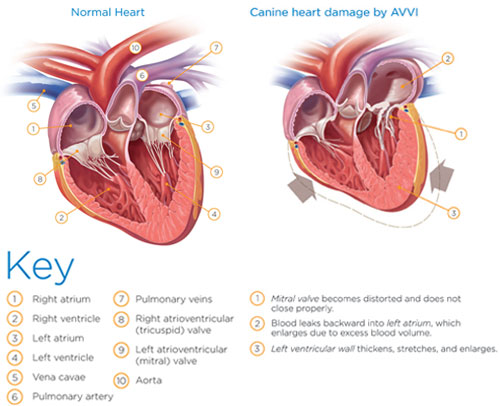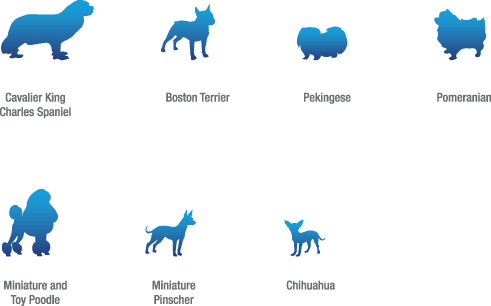 Atrioventricular valvular insufficiency (AVVI)
Atrioventricular valvular insufficiency (AVVI)
Overview
AVVI is a degenerative disease that damages heart valve leaflets as it progresses. This damage prevents heart valves from closing properly, allowing blood to leak backward into the atrium. This leakage eventually results in a heart murmur detectable via auscultation. Valve leakage impairs cardiac function and circulation, ultimately leading to congestive heart failure (CHF).
AVVI in action

Progression of AVVI
AVVI, the most frequent cause of CHF in dogs, is a slowly progressing disease.1,2 The prevalence of this disease gradually increases with age. AVVI affects3:
- 10% of dogs 5 to 8 years of age
- 20% to 25% of dogs 9 to 12 years of age
- 30% to 35% of dogs over age 13 years
This increase is especially dramatic in small breeds, with up to 85% showing evidence of valvular lesions at necropsy by 13 years of age.4
Breeds at risk for AVVI

AVVI occurs most often in small- to medium-sized breeds of dogs.1 Breeds most susceptible to AVVI include the Boston Terrier, Cavalier King Charles Spaniel, Chihuahua, Miniature Pinscher, Miniature and Toy Poodle, Pekingese, and Pomeranian.5 Ultimately, all small breed dogs are at risk for CHF due to AVVI.
References:
1. Rush JE. Chronic valvular heart disease in dogs. Proceedings from the 26th Annual Waltham Diets/OSU Symposium for the Treatment of Small Animal Cardiology; October 19–20, 2002. Available at: www.vin.com/proceedings/Proceedings.plx?CID=WALTHAMOSU2002&PID=2988. Accessed January 21, 2011. 2. Sisson D. Valvular heart disease in dogs. Proceedings from the WSAVA 2002 Congress; October 3–6, 2002; Granada, Spain. Available at: www.vin.com/proceedings/Proceedings.plx?CID=WSAVA2002&PID=2532. Accessed January 21, 2011. 3. Lombard CW, Jöns O, Bussadori CM; for the VetSCOPE Study. Clinical efficacy of pimobendan versus benazepril for the treatment of acquired atrioventricular valvular disease in dogs. J Am Anim Hosp Assoc. 2006;42(4):249–261. 4. Atkins C, Bonagura J, Ettinger S, et al. Guidelines for the diagnosis and treatment of canine chronic valvular heart disease. J Vet Intern Med. 2009;23(6):1142–1150. 5. Ware WA. Cardiovascular Disease in Small Animal Medicine. Ames, IA: Blackwell Publishing Professional; 2007.

 VETMEDIN is a registered trademark of Boehringer Ingelheim Vetmedica GmbH,
licensed to Boehringer Ingelheim Vetmedica, Inc.
VETMEDIN is a registered trademark of Boehringer Ingelheim Vetmedica GmbH,
licensed to Boehringer Ingelheim Vetmedica, Inc.